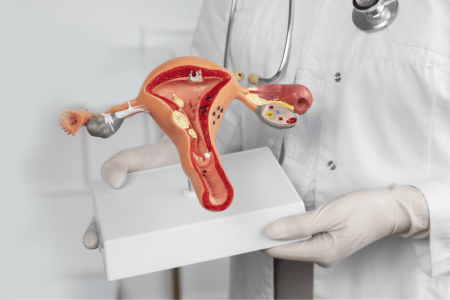Signs & Symptoms:

- Abdominal bloating or swelling
- Pelvic or abdominal pain
- Difficulty eating or feeling full quickly
- Urinary urgency or frequency
- Fatigue, Back pain
- Constipation
- Menstrual changes
- Abnormal vaginal bleeding
Causes

Stages:

Stage 1: The cancer is confined to one or both ovaries.
Stage 2: The cancer has spread to the uterus or fallopian tubes.
Stage 3: The cancer has spread to the abdomen or lymph nodes.
Stage 4: The cancer has spread to other parts of the body, such as the lungs or liver.
Risk Factors:
- Age: Ovarian cancer is more common in women over the age of 50.
- Family history: Women with a family history of ovarian cancer have a higher risk of developing the disease.
- Genetic mutations: Some women may have inherited mutations in genes that increase the risk of ovarian cancer.
- Reproductive history: Women who have never been pregnant, or had their first child after the age of 35, have a higher risk of developing ovarian cancer.
Preventing, Screening, and Diagnosing Ovarian Cancer
Prevention:
- Understanding your family history: Be aware of any history of ovarian cancer in your family, as women with a family history of the disease have a higher risk of developing it.
- Maintaining a healthy lifestyle: Eating a healthy diet, exercising regularly, and maintaining a healthy weight can all help reduce your risk of ovarian cancer.
- Birth control: Using oral contraceptives (birth control pills) for several years can help reduce the risk of ovarian cancer.
- Risk-reducing surgery: Women at high risk of developing ovarian cancer may consider having their ovaries and fallopian tubes removed as a preventative measure.
Screening:
- Regular pelvic exams: Women should have regular pelvic exams with their healthcare provider, as this can help detect ovarian cancer in its early stages.
- Transvaginal ultrasound: Transvaginal ultrasound is a non-invasive test that uses sound waves to create images of the ovaries and can detect abnormalities.
- CA-125 blood test: The CA-125 blood test measures the levels of a protein called CA-125 in the blood. Elevated levels of CA-125 can be an indicator of ovarian cancer, but this test is not always accurate.
Diagnosis:
- Physical exam: A healthcare provider will perform a physical exam to check for any signs of ovarian cancer.
- Imaging tests: Imaging tests, such as CT and MRI scans, can help detect any abnormalities in the ovaries or other parts of the body.
Biopsy: A biopsy, in which a small sample of tissue is taken from the ovaries, is often performed to confirm a diagnosis of ovarian cancer
Treatment Options for Ovarian Cancer:
Ovarian cancer is a serious disease that requires prompt and effective treatment. Here’s what you need to know about the treatment options available for ovarian cancer.
- Surgery:
- The most common treatment for ovarian cancer is surgery to remove the ovaries, fallopian tubes, and uterus (total hysterectomy and bilateral salpingo-oophorectomy).
- Depending on the stage and location of the cancer, the surgeon may also remove other surrounding tissues, lymph nodes and organs, such as the omentum and spleen.
- Surgery may be performed through open incision or laparoscopically.
- Chemotherapy:
- Chemotherapy uses drugs to kill cancer cells, it’s usually recommended after surgery to destroy any remaining cancer cells and reduce the risk of the cancer coming back.
- The drugs used in ovarian cancer treatment are given intravenously, and may be administered in cycles.
- The side effects of chemotherapy can include hair loss, nausea, vomiting, and an increased risk of infection.
- Radiation therapy:
- Radiation therapy uses high-energy rays to destroy cancer cells.
- It’s mostly used in cases of advanced ovarian cancer or in recurrent cases.
- Targeted therapy:
- Targeted therapy uses drugs that target specific mutations or proteins in cancer cells.
- It’s used mainly in advanced stages of ovarian cancer, and help reduce symptoms and improve quality of life.
- Hormone therapy:
- Hormone therapy is used to block the production of hormones that can fuel the growth of cancer cells, or to deprive cancer cells of the hormones they need to grow.
- Clinical Trials:
- Clinical trials are research studies that involve patients and test new treatments.
- These trials are an option for women with advanced ovarian cancer, or whose cancer has recurred, as they offer access to experimental treatments that may not be available elsewhere.
It’s important to note that treatment options are tailored to each individual case and the stage of the cancer, and the treatment plan is usually developed by a team of oncologists, gynecologist, and radiation oncologists. It’s also important to consider the possible side effects and risks of each treatment options, and to discuss these with your doctor to make an informed decision.
It’s also important to note that Ovarian cancer treatment may affect fertility, and women who hope to have children in the future should discuss with their doctor the options available for preserving their fertility before undergoing treatment.
Post-treatment follow-up:
- Regular check-ups with your healthcare provider
- Imaging tests, such as ultrasound, to check for any signs of recurrent cancer
- Blood tests, such as CA-125, to monitor for any changes in levels
- Hormone replacement therapy, if surgery has removed the ovaries
It’s important to note that early detection and treatment are key for successful outcome for ovarian cancer and regular check-ups are important, it’s also important to consult with an expert gynecologist/oncologist for a personalized treatment plan that best suits your case.
It’s also worth noting that Ovarian cancer symptoms can be similar to many other conditions so not every symptoms are specific to ovarian cancer, if you suspect something is not right with your body, it’s best to consult with a doctor.
Contact Us
Visiting Hours
OPEN 24 hours 7 days a week.
OPD Timings : Monday to Saturday
( 9:00 AM to 5:30 PM )
Appointments
Emergency
Visit the hospital
MGM Cancer Institute
No 119 & 121, Nelson Manickam Road, Raajeswari Street, Rajaram Mehta Nagar,
Aminjikarai, Chennai – 600029




















